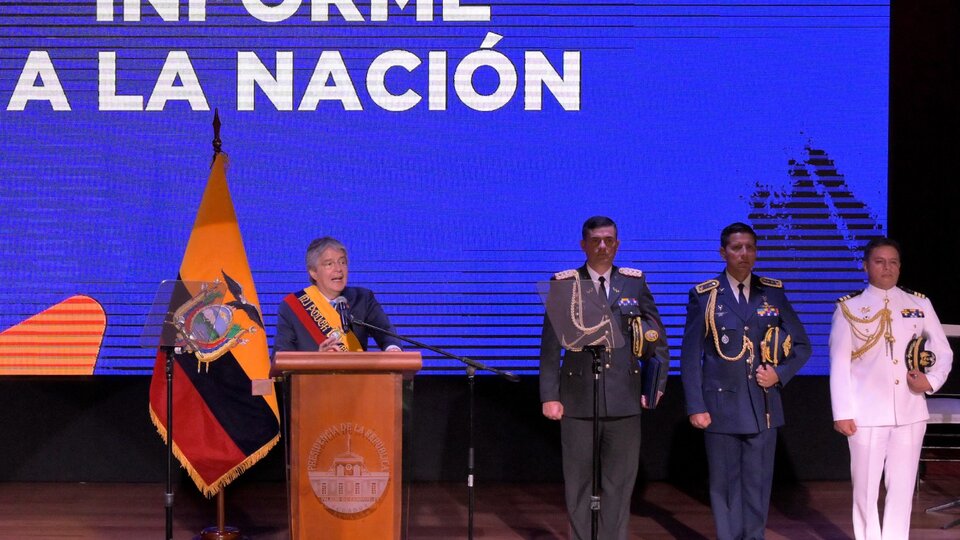Ecuador will hold early general elections on August 20 after the president Guillermo Lasso dissolved Parliament opponent, whom he accused this Wednesday of “abuse of power” and responsible for the current political crisis. In his management report, the outgoing president defended the “cross death” as a decision against “coup efforts.” Lasso with that maneuver stopped impeachment against him.
He National Electoral Council approved that the election of the president and his vice president, as well as the 137 deputies, take place in three months. If necessary, the ballottage will be on October 15.
Cornered by impeachment In the unicameral National Assembly, the right-wing Lasso decided to dissolve it a week ago, making use of his constitutional power, which contemplates early elections to complete the four-year period (until May 2025).
The ruler decreed the dissolution due to a “serious political crisis and internal commotion” in the middle of the motion to which he was submitted by the opposition majority of the Legislature, which, led by the left, accused him of embezzlement.
“I put an end to a political confrontation that had the country immersed in a crisis that worsened over time,” he said. Lasso when presenting the report of his second year in office in the auditorium of a complex of ministries in the south of Quito.
Dissolving the National Assembly “closed a long chapter of deinstitutionalization and abuse of power, led by political sectors that had set the cooptation of the entire State as their goal,” he added.
Lasso, a conservative former banker whose credibility dropped to 10%, He will be able to run again to finish the term he assumed in 2021 without it being a re-election, which by law is only allowed once.
For the elections of provincial mayors and prefects (governors) last February, 13.4 million of the 18.2 million Ecuadorians were summoned.
“Let go of power”
“My most recent decisions have shown that I am truly willing to get rid of power, even more so if it is about protecting democracy in Ecuador,” said the president in his one and a half hour speech before authorities from other state functions and ambassadors.
Thus he complied with delivering his report despite the fact that the Constitution orders him to do so before Parliament, today dissolved.
Ecuador faced the worst period of democratic instability in its history between 1996 and 2007, in which it had seven leaders until the arrival of the socialist Rafael Correa (2007-2017).
The head of state maintained that after his decision “never again will a President of the Republic be at the mercy of an Assembly that dedicates its time to conspiring and preventing a government from advancing on the country’s development agenda.”
Previously, appointed businessman and politician César Rohon as Minister of Transportation and Public Works to replace Darío Herrera.
After his report, Lasso, 67, will travel to the United States for a medical intervention. His return is scheduled for next Sunday.
During his tenure, the Ecuadorian president has traveled to that country several times for health reasons, such as skin cancer and spinal operations.
difficult stage
Despite the violence linked to drug trafficking, Ecuador remains calm after the dissolution of the Legislative, which traditionally registers a high level of citizen distrust.
“We are facing a difficult stage, but we continue to fight fiercely the mafias that want to destroy society,” said Lasso, who wages a war against drug trafficking, terrorism and organized crime.
“We cannot allow organized crime to try to dominate Ecuador with the complicity of politicians who are traitors to the country, or bad public servants,” he emphasized.
He also stressed that in his two-year government the police have seized the record number of “420 tons of drugs.”
In the absence of Congress, andThe president can govern through decree-laws of economic urgencybut prior favorable opinion of the Constitutional Court (CC).
Social and indigenous organizations warned that they will monitor the decree-laws issued by the Executive, which they point out for maintaining neoliberal policies that affect the cost of living.
The president has already issued decree-laws on reforms to the creation of new free zones in depressed and border areas and others related to tax changes such as expanding the deductibles in calculating the income tax of workers, to lighten the tax burden on the middle class. The Constitutional Court has not yet given its approval.
